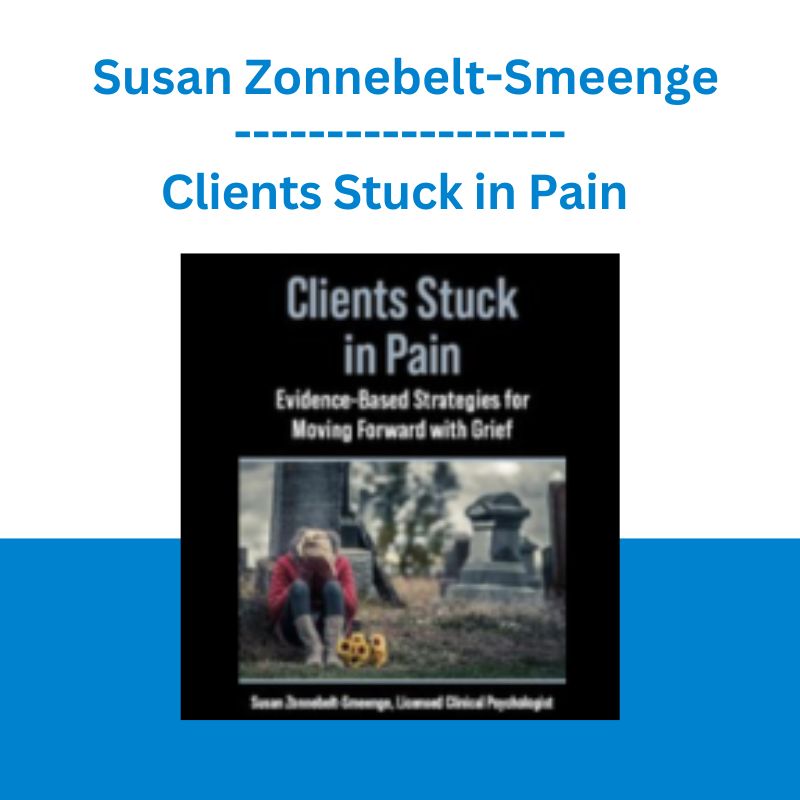*** Proof of Product ***
Exploring the Essential Features of “Clients Stuck in Pain – Susan Zonnebelt-Smeenge”
You know how frustrating it is when your client is “stuck” in their grief. Unable to process, unable to move forward or make any progress, it’s tough on both of you. That’s why Dr. Susan Zonnebelt-Smeenge has put together this engaging session, giving you the framework for connecting with your grieving clients and helping them along on their grief journey. You’ll learn new evaluation strategies, effective coping methods, and ways to reframe misinformed beliefs that will set your clients on a path to healing.
Speaker
Susan Zonnebelt-Smeenge, PsyD, RN
At the age of twenty-eight, my husband was diagnosed with a malignant brain tumor and was expected to live only another one to two years. At that time, I gained momentum to finish my doctoral degree to become a licensed psychologist so I could better provide for my 18-month-old baby girl and my husband. Rick actually lived for 18 years and died when our daughter was in her first semester of college. Throughout Rick’s terminal diagnosis, I knew I would ultimately be widowed at mid-life, so I chose to do my dissertation on grief and bereavement. Upon graduation, I began my career as a clinical psychologist at Pine Rest Mental Health Services, Grand Rapids, MI. Responsibilities included testing and psychotherapy with the adult population, but I did some work with adolescents as well, particularly in the areas of family conflict and eating disorders. Throughout my career in outpatient services, I specialized in loss, dying and grief issues while also providing services to help people deal with adjustment to chronic medical conditions, dealing with terminal illness, treatment of anxiety, depression and self-esteem issues including abuse components, as well as marital, family and work conflicts.
In 1997, I co-authored a book on spousal loss with Dr. Robert DeVries, a pastor and seminary professor who had also been widowed at mid-life. We eventually married and developed a dedicated mission to bereaved individuals through our writing, speaking, training, and teaching. From the time of our marriage to the present, we have continued to be very involved in conducting educational grief support groups, consulting and speaking at churches and other organizations on grief and bereavement issues, as well as presenting at major national conferences across the country. We have presented workshops on various aspects of counseling for the bereaved and a number of professional organizations, such as The American Association of Christian Counselors (AACC) as well as the National Funeral Directors Association, the Association of Death Education and Counseling, the International Parish Nurse Symposium, the International Conference on Death and Bereavement (La Crosse, WI), and National Hospice and Palliative Care Organization, along with several others.
Since 2012, we took up residence in the bustling Atlanta, GA area for 6 to 8 months of the year because of family there, returning to beautiful West Michigan for the summer months. I am fully licensed as a psychologist in both Michigan and Georgia, and since Covid have been able to see clients both in person and virtually. I also have had short term reciprocity in a number of other states during the active Covid pandemic, and many states continue to offer that option.
Speaker Disclosures:
Financial: Susan Zonnebelt-Smeenge maintains a private practice. She receives royalties as a published author. Susan Zonnebelt-Smeenge receives a speaking honorarium from PESI, Inc. She has no relevant financial relationships with ineligible organizations.
Non-financial: Susan Zonnebelt-Smeenge has no relevant non-financial relationships.
Objectives
- Assess and correct clients’ misconceptions about grief with evidence-based knowledge to improve treatment outcomes
- Educate clients on a research-supported grieving framework and its five key goals to improve client engagement
- Facilitate the creation of personalized, healthy coping strategies for clients, put to practical use in-session
- Assist clients in redefining their identity post-loss, to inform clinical treatment interventions and improve client level of functioning
- Encourage clients to transform grief into gratitude through focused grief work to improve clinical outcomes
Outline
What is “stuck?”
- When grief becomes complicated grief or Prolonged Grief Disorder
- Identifying what is keeping clients from progress in the grief process
- DSM-5 symptoms
- Myths, biases, or misinformation – irrational beliefs
- Reframing misinformed beliefs re healthy grieving: planting seeds – food for thought; historical perspective of what contributed to those beliefs.
Significant ingredients to moving forward:
- Balancing perspective of difficulty vs possibility
- Healthy self-concept and self-esteem
- Effective coping- mechanisms to re-implement in present death situation
- Guiding clients towards a healthy understanding of the grief process
Evidence-based behaviors essential for grieving
- Providing a tribute to honor the deceased’s life
- Dealing with all the deceased’s belongings (clothing, hobbies, interests, equipment, and memorabilia)
- Identify all the roles that the deceased played for your client and determine ways to compensate for the holes left
- Encourage the client to journal to identify feelings and create a pathway to resolve those of a negative, unfinished nature
- Strengthen ongoing supportive relationships
- Talk about the life and death of the deceased
- For persons who have been widowed:
- Assist him/her to see that the marriage has ended and eventually the wedding ring needs to be removed from the marriage finger and put somewhere else
- Assist the person grieving to see that she/he is a single person whose husband/wife has died
Growth through loss because of the death
- Psychological growth related to SELF
- Emotional and spiritual growth related to SELF
- Outcomes of the grief journey
Risks and Limitations
Target Audience
- Psychiatrists
- Psychologists
- Counselors
- Social Workers
- Marriage and Family Therapists
- Nurses
- Physicians
- Other Mental Health Professionals
Please see the full list of alternative group-buy courses available here: https://lunacourse.com/shop/










 Matthew Kratter - Trader University
Matthew Kratter - Trader University  Toshko Raychev - Profit System + ITF Assistant
Toshko Raychev - Profit System + ITF Assistant  Alphashark - The AlphaShark SV-Scalper
Alphashark - The AlphaShark SV-Scalper  Jesse Livermore Trading System - Joe Marwood
Jesse Livermore Trading System - Joe Marwood  Akil Stokes & Jason Graystone - TierOneTrading - Trading Edge 2019
Akil Stokes & Jason Graystone - TierOneTrading - Trading Edge 2019  Money Miracle - George Angell - Use Other Peoples Money To Make You Rich
Money Miracle - George Angell - Use Other Peoples Money To Make You Rich  George Fontanills & Tom Gentile - Optionetics 6 DVD Series Home Study Course (Digital Download)
George Fontanills & Tom Gentile - Optionetics 6 DVD Series Home Study Course (Digital Download)  Racing Workshop - Complete Online Package
Racing Workshop - Complete Online Package  Emanuele Bonanni - My Trading Way
Emanuele Bonanni - My Trading Way  SMB - Options Training
SMB - Options Training  Chris Capre - Advanced Price Action Ongoing Training & Webinars
Chris Capre - Advanced Price Action Ongoing Training & Webinars  George Fontanills & Tom Gentile - Optionetics Wealth Without Worry Course
George Fontanills & Tom Gentile - Optionetics Wealth Without Worry Course  Dave Landry - Stock Selection Course
Dave Landry - Stock Selection Course  The Daily Traders – Exclusive Trading Mentorship Group
The Daily Traders – Exclusive Trading Mentorship Group  Team NFT Money - Ultimate NFT Playbook
Team NFT Money - Ultimate NFT Playbook  Sovereign Man Confidential - Renunciation Video
Sovereign Man Confidential - Renunciation Video  Erik Banks - Alternative Risk Transfer
Erik Banks - Alternative Risk Transfer  Julie Stoian & Cathy Olson - Launch Gorgeous - Funnel Gorgeous Bundle
Julie Stoian & Cathy Olson - Launch Gorgeous - Funnel Gorgeous Bundle  Oliver Velez - Essential Strategy Of Trade For Life
Oliver Velez - Essential Strategy Of Trade For Life  Developing Characters, Environments, and Story Boards - Mary Jane Begin
Developing Characters, Environments, and Story Boards - Mary Jane Begin